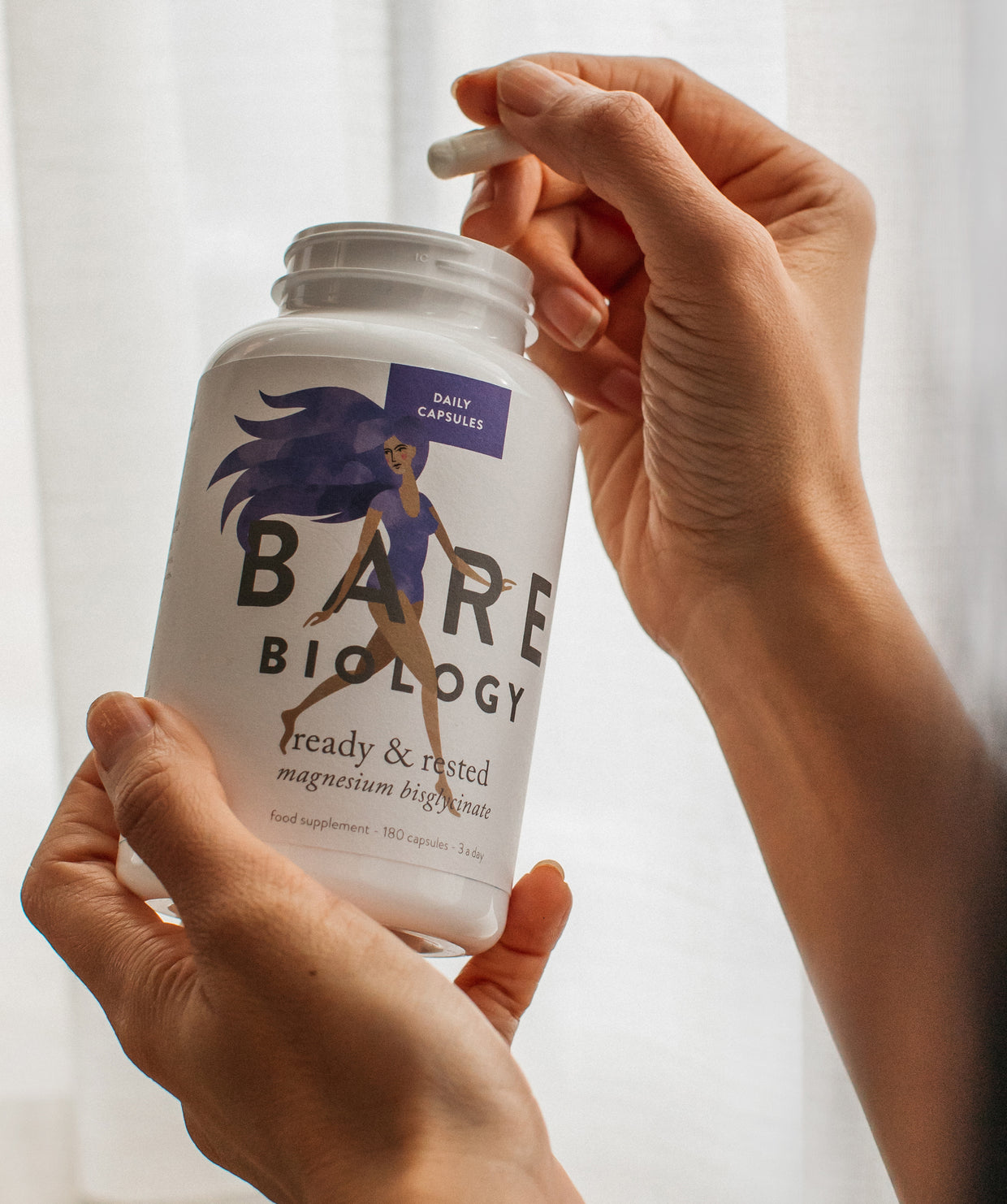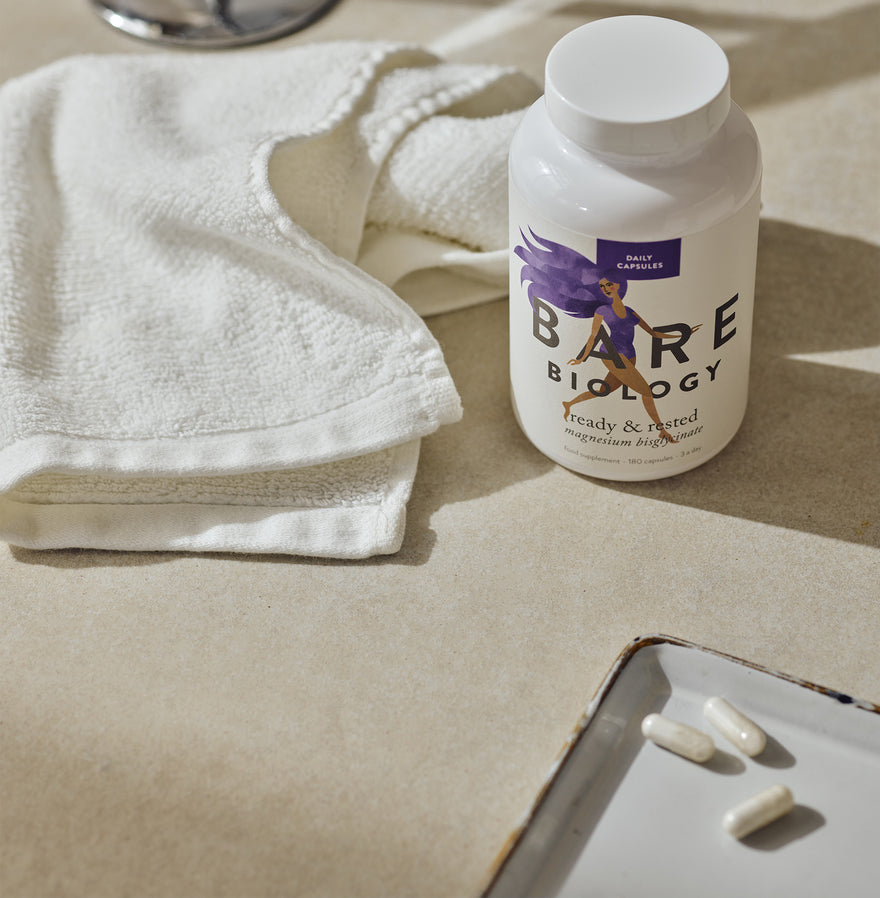The missing mineral: why magnesium matters
CONTENTS
If your mornings feel like a low-level hangover—but you can't remember the last time you even had the energy for a drink—you might be stuck in a magnesium deficiency loop. It's not that your body can't cope with life; it's just missing the multi-tasking mineral magnesium.
When we learned that stress depletes magnesium stores and low magnesium makes us more stressed, the penny dropped. Much like everything we wish we'd known earlier, the stress-magnesium cycle can be broken. It's an easy fix: up your intake of magnesium-rich foods or give your body the proper supplementation.
How do you know if you're low?
If your symptoms feel like a mystery to doctors—poor sleep, nervous tension, stop-start energy levels, or the push-pull of exhaustion and burnout that makes socialising, exercise, and work feel overwhelming, it could be that you are running low.
Most of the U.S. is magnesium deficient (up to 60%). In the U.K., nearly 1 in 5 young adults don’t meet the recommended magnesium intake, and almost 20% of women aged 20–59 aren’t getting enough daily magnesium.
Reaching your daily magnesium intake through food alone means eating about 12 bananas or 100g of almonds every single day. That's expensive and probably leads to other complications (like your mortgage or a poorly tummy). Supplementing makes life easier. You get what you need without worrying about overloading your system—or going completely bananas.
Magnesium is essential—whether you're recovering from exercise, managing stress, or just trying to get a good night's sleep. It's the original Renaissance mineral.

What does magnesium actually do?
Good question. It's a natural mineral (Mg)—you might remember revising your periodic table in science. Magnesium sits above calcium and to the right(ish) of potassium, and it's just as essential for your body as that pair. You'll find it in the Earth's crust, the sea, and almost every part of your body.
Magnesium is one of the most essential minerals in the body, quietly working behind the scenes to keep everything running smoothly. It's involved in over 300 enzymatic reactions in the body, regulating muscle function, regulating stress, and playing a key role in energy production.
Often called nature's tranquiliser, magnesium helps calm the nervous system and relax muscles. Because it reduces tension, it's marketed for improving sleep. But it's also essential for energy—your body needs it to produce ATP (adenosine triphosphate), the molecule that fuels every cell. Without enough magnesium, you might feel fatigued, struggle with muscle cramps, or find it harder to wind down at night. In short, magnesium is more than just a natural "off switch" for the nervous system; it's a proper multitasker.
Magnesium and vitamin D work together. Magnesium activates vitamin D in the body, helping it to be absorbed and put to work. Together, they regulate immune function, reduce inflammation, and strengthen bones (low magnesium levels are even linked to an increased likelihood of fractures). Cover your bases, try Ready & Rested with our high-strength Beam & Balance vitamin D sprays.
There's more. Beyond energy and relaxation, magnesium supports bone health and heart health, regulates blood pressure, and plays a role in glucose metabolism. Simply put, magnesium is essential—whether you're recovering from exercise, managing stress, or just trying to get a good night's sleep. It's the original Renaissance mineral.
Magnesium deficiency: do you have the common signs?
Because magnesium is involved in so many functions in your body, it can be hard to tell whether you're running low or just running out of steam. Symptoms can range from insomnia and restless legs to more complex issues like loss of appetite, lethargy, nausea, vomiting, fatigue, and weakness. If a deficiency progresses, you might experience more serious symptoms, such as muscle cramps, unusual neuromuscular activity (like tremors or spasms), and, in extreme cases, even seizures.
Many of us become low in magnesium without realising it. Don't panic. It's easily fixed. If you've noticed a sudden drop in energy, frequent night-time waking, or muscle cramps, don't overthink it. It might be a good idea to get tested or increase magnesium in your diet with food or a supplement.
Over time, magnesium deficiency can pose more serious health risks. Since it's involved in so many processes in the body, its deficiency is linked to a wide range of health concerns—from migraines and ADHD to critical risks affecting heart function, stroke, diabetes, and cardiovascular disease.

Benefits of magnesium
Exercise recovery
Magnesium is essential for moving our bodies. It powers muscle repair and fuels our energy stores by helping produce ATP (adenosine triphosphate), the body's energy molecule. Surprisingly, the same mineral that calms us down also motivates us. Put simply magnesium binds to ATP, making energy transfer more efficient, stabilising electrolytes (think hydration, hydration, hydration) and flushing out muscle waste during exercise.
Just like stress depletes magnesium, so does sweating. For those looking to maximise performance or recover faster, take note of this study. Magnesium helps us to stay mobile. Declining magnesium levels as we age have been linked to loss of grip, strength, balance, and muscle regeneration.
Improving sleep quality
When our founder, Mel, started looking into magnesium for sleep, she hoped it would resolve her sleep issues. Instead, she found herself on a longer journey—one that ultimately led to creating our magnesium, Ready & Rested, in the bisglycinate form that did, in fact, help her sleep better.
Magnesium is often linked to better sleep, but the science isn't entirely conclusive. While it's well established that magnesium can reduce stress —which might make you sleep better—the direct proof that supplementation will send you off to sleep is still being studied.
A meta-review of nine high-quality studies, including over 7,500 subjects, found an interesting pattern. Observational studies (where subjects aren't given an intervention) showed that higher magnesium levels were associated with better sleep quality, fewer sleep disturbances, and reduced daytime sleepiness. However, randomised controlled trials (RCTs), which included magnesium supplementation, produced mixed results—some found improvements in sleep efficiency and duration, while others showed no significant impact in those with poor sleep quality.
So, can magnesium make you fall asleep? Maybe not directly. However, maintaining healthy magnesium levels could mean better quality sleep with less waking in the night, a deeper recovery and feeling more rested during the day. So you can relax.
Promoting overall wellness
From your head to your toes, we say magnesium is like the Swiss Army knife of the mineral world because it supports the whole body. It would be impossible to list all 300 enzymatic reactions magnesium is involved in, but here are the functions of the body where it makes the most difference:
- Muscles: Magnesium supports normal muscle function, helps reduce delayed onset muscle soreness (DOMS), and aids muscle recovery.
- Energy: It plays a key role in energy production and helps regulate glucose metabolism in the body.
- Bones: Magnesium is essential for bone strength, supporting the cells responsible for maintaining bone density and helping to reduce the risk of fractures.
- Heart: In critical life-sustaining systems, magnesium is integral to normal heart function, helping to maintain healthy blood pressure and reducing the risk of hypertension.
- Nervous System & Rest: Magnesium supports normal nerve function, which may help you switch off mentally and rest more effectively, potentially benefiting psychological wellbeing.
Phew. Have we covered everything? Probably not—but that’s just how essential magnesium is.
Reducing stress
Perhaps even more important to understand, though, is that magnesium depletion isn't just a by-product of stress—it also plays a role in managing it. Research shows that magnesium helps regulate stress hormones and brain activity, making us feel less stressed overall.
For example, cortisol (the classic stress hormone) is lower in people with healthy magnesium levels because magnesium reduces the release of ACTH, which triggers cortisol production. It also supports mood by enhancing serotonin and increasing GABA—neurotransmitters that promote calm and relaxation—while reducing glutamate, which can overstimulate the brain. On top of that, magnesium protects against oxidative stress, which can cause long-term damage to brain cells.
As you can see, it's a nasty cycle: low magnesium makes us more prone to stress, which then depletes our magnesium levels even further. Over time, chronic stress is bad news for both the body and the mind. Research into magnesium's links with anxiety and magnesium with depression shows this two-way relationship, which is scary stuff. The good news? The excellent news is that raising your magnesium levels could help break that cycle and hand you back the keys to your body.

How to get your magnesium fix
How can you get your daily dose of magnesium? We always recommend food first. Here is a quick list of the foods that contain the most magnesium: almonds, spinach, cashews, soy milk, black beans, edamame, peanut butter, brown rice, whole wheat bread, and avocado—these are all great sources. Even bananas have a decent amount.
But to reach the recommended 300–400 mg daily from food alone, you’d need around 12 bananas or about 100 g of almonds. Not exactly the easiest approach. Three capsules of Ready & Rested will give you 375mg. That’s your daily dose sorted.
Different forms of magnesium
There are many forms of magnesium, each absorbed differently by the body. As a result, their effects vary wildly, from supporting mood and cognitive function to easing indigestion or constipation—depending on how they're absorbed and the molecule they're bound to.
We use magnesium bisglycinate in Ready & Rested because it's highly bioavailable, meaning it can reach your nervous system to help you relax. Just as importantly, it's gentle on the stomach.
If you want to become a magnesium aficionado, check out Rhonda Patrick's breakdown of different forms. For most people, it's important to know that citrate, glycinate, chloride, and aspartate are typically better absorbed, making them great for mood and sleep support. You may have seen magnesium chloride oils or magnesium sulfate baths, which are brilliant for muscle relaxation and the dreaded DOMS relief but won't reach your bloodstream.
Magnesium threonate and magnesium citrate are often taken for cognitive benefits, though some people find them less tolerable. Doctors sometimes recommend citrate for gentle laxative or heartburn relief, while glycinate is known for its calming effect and is usually well tolerated—hence why it’s the foundation of Ready & Rested.
Daily magnesium requirements
The recommended dietary allowance (RDA) for magnesium for most adults is around 300–400 mg per day. There is a marginal gender difference. In the U.S., the Food and Nutrition Board recommends a daily intake of 420 mg for men and 320 mg for women, while in the UK, the NHS recommended daily intake is 300 mg for men and 270 mg for women. Taking magnesium during pregnancy is seen as positive (if not recommended). However, if you have any doubts or have a specific condition, you'd be best off speaking to a doctor before taking any supplement, including magnesium. How can you get your daily dose of magnesium? We always recommend food first. Here is a quick list of the foods that contain the most magnesium: almonds, spinach, cashews, soy milk, black beans, edamame, peanut butter, brown rice, whole wheat bread, and avocado—these are all great sources. Even bananas have a decent amount.
But to reach the recommended 300–400 mg daily from food alone, you’d need around 12 bananas or about 100 g of almonds. Not exactly the easiest approach. Three capsules of Ready & Rested will give you 375mg. That’s your daily dose sorted.
Magnesium in clinical studies
Magnesium and heart health
Your heart is a complicated system (quelle surprise). It keeps you alive through a network of simultaneous actions, and magnesium plays a role in many of them. Studies show that magnesium supplementation can help lower blood pressure (hypertension) and reduce the risk of stroke, which may, in the long run, protect against cardiovascular disease.
How? Well, it's complex. But here's the short version: magnesium helps relax blood vessels, improve blood flow, and balance electrolytes (sodium, calcium, and potassium). All of which are essential for a healthy heart. Over time, this reduces inflammation and oxidative stress, two major contributors to heart disease.
Magnesium and diabetes
Magnesium plays a key role in energy production and regulation in the body. It's essential for the production of ATP (adenosine triphosphate), the body's main energy source, which powers the body to move, exercise and recover after a workout. This same system function of magnesium supports healthy blood glucose levels, which is especially important for people with diabetes. Diabetes occurs when the body is unable to effectively use or produce insulin—the hormone that regulates glucose uptake into cells for energy. Magnesium helps regulate glucose metabolism and supports insulin sensitivity, meaning it helps the body respond effectively to insulin. Studies show that increasing magnesium intake reduces the risk of Type 2 Diabetes and improves insulin sensitivity, making it an important mineral for blood sugar balance.
We recommend taking magnesium with food—it’s best for absorption, gentler on your stomach, and easier to remember.
Tips for getting the most out of magnesium
It’s important to listen to your body when deciding when and how to take magnesium. Adjust your dose as you find what works best. What time you take your dose depends on your goals: if you’re looking for more morning energy, try magnesium with breakfast; for better sleep, take it with your evening meal. You could also split your dose throughout the day. We recommend taking magnesium with food—it’s best for absorption, gentler on your stomach, and easier to remember.
If you think you’re low on magnesium, start with one Ready & Rested capsule, then increase to two, and build up to the full three-capsule dose (375 mg)—100% of your daily intake. Adjust as needed.
There are different ways to take magnesium, but capsules absorb better than topical forms like sprays, creams or crystals, which are better for quick relief after exercise. Capsules are more likely to reach your nervous system and support energy regulation because they are absorbed into the bloodstream. Magnesium rarely clashes with other nutrients, but it does compete with calcium, so if you’re taking both, space them out to ensure each is absorbed properly.

FAQs
What happens if you have low magnesium?
In the short term, you might notice disrupted sleep, reduced energy, and increased muscle soreness—especially after exercise (the dreaded DOMs). Over time, prolonged magnesium deficiency has been linked to more serious health issues, including a higher risk of type 2 diabetes and heart disease.
What is the best source of magnesium?
Food. Food first, supplements second. While we always recommend prioritising nutrition, getting 300-400mg of magnesium solely from food can be impractical (we love bananas, but 12 a day is too much).
Is it good to take magnesium every day?
Yes. If you stick to our recommended dosage, magnesium is safe to use daily. However, it's important to listen to your body and adjust if you notice any changes.
What are the signs of low magnesium?
Many of us are running low on magnesium without realising it, as its symptoms often mimic the effects of stress and a busy lifestyle. Early signs of low magnesium include sudden, unexplained fatigue, difficulty sleeping, muscle cramps, or restless legs.
What food is highest in magnesium?
Leafy greens are excellent—the darker, the better. Choose kale, spinach, and Swiss chard for the most magnesium. Unprocessed nuts, seeds (such as pumpkin, sunflower, and sesame), and whole grains like brown rice and whole wheat bread all contain a good amount. Some fruits, like bananas, make for an easy, quick snack.
How long does it take to recover from magnesium deficiency?
This depends on the severity of the deficiency and individual factors like the dietary intake of magnesium-rich foods and how well your body absorbs magnesium. Some people notice improvements in sleep and stress levels within days, while issues like hormone balance may take a few months. If you're concerned about a severe deficiency, it's best to seek advice from your doctor.


